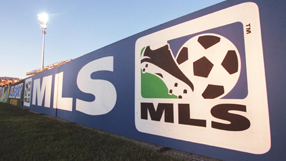
MLS attendances last season rose to an average 17,872, up seven percent, with the league's best supported team, the Seattle Sounders, averaging 38,496 per game.
But the television ratings for the league remain just a fraction of those for the big three U.S. sports - the NFL, NBA and Major League Baseball.
The North American league also has to compete against overseas soccer, with England's Premier League proving to be more popular viewing than the domestic product.
While Garber is delighted to see teams growing their support in local communities, breaking through on television remains the missing link.
"Growing our television ratings is a priority. It is a function of our marketing efforts. It is a function of ensuring that we have the right schedule, that we have the right promotion platform with our television partners and that we have a product that people care about.
"Those four things are pillars if you will that we focus on almost every day," he said on a conference call ahead of Saturday's opening game of the league's 17th season.
Garber accepts that making the ratings dial move won't be a quick process.
The best features, fun and footballing quizzes, straight to your inbox every week.
MLS VISION
"By 2022 if we are going to achieve our vision and be one of the top leagues in the world we are going to have to have higher television ratings. There is no doubt about that.
"But the growth of our TV audience, we believe, is a function of the growth of the overall popularity of the league, our players and our clubs. And that is a process that is going to take some time," he said.
The good news for MLS is that time appears to be on their side - a recent ESPN-Luker sports poll had 'pro-soccer', including MLS and the international game, as the number two sport for those aged between 12-24-years-old.
While it is a tough sell to get fans without a local team to watch MLS matches on a weekend, the league is certainly making it easy for them to find a game if they wish.
This season, MLS games will be broadcast on the rebranded NBC Sports channel for the first time along with long-term partner ESPN and on TSN in Canada.
The league is also looking to cement its place on Spanish-language broadcasting on the Univision networks and ESPN and the French language RDS channel in Canada.
In addition clubs have deals with local networks while the league on Thursday unveiled an improved online and digital subscription package which allows fans to see over 230 'out of market' games on mobile devices, tablets such as iPads and other digital platforms.
MLS was launched in 1996 and has grown from 10 to 19 clubs with Montreal Impact joining the league this season.
 Join The Club
Join The Club





